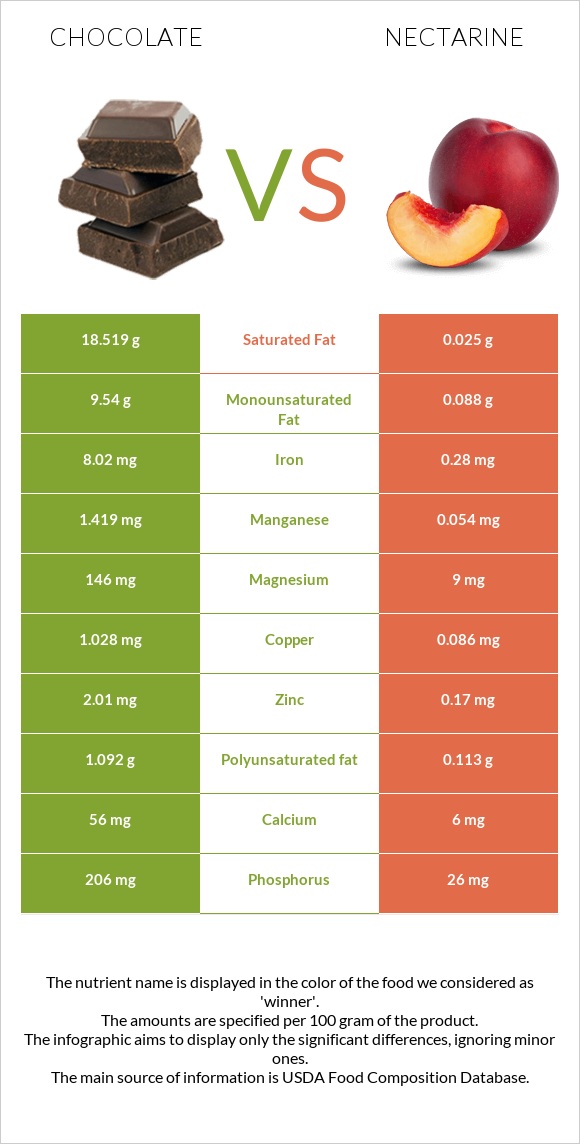Chocolate vs. Nectarine — In-Depth Nutrition Comparison
Compare
Summary of differences between chocolate and nectarine
- The amount of copper, iron, manganese, magnesium, phosphorus, fiber, zinc, potassium, and vitamin B12 in chocolate is higher than in nectarine.
- Chocolate covers your daily need for copper, 105% more than nectarine.
- The amount of saturated fat in nectarine is lower.
- Chocolate has a lower glycemic index. The glycemic index of chocolate is 23, while the glycemic index of nectarine is 43.
These are the specific foods used in this comparison Chocolate, dark, 45- 59% cacao solids and Nectarines, raw.
Infographic

Infographic link
Mineral Comparison
Mineral comparison score is based on the number of minerals by which one or the other food is richer. The "coverage" charts below show how much of the daily needs can be covered by 300 grams of the food.
| Contains more MagnesiumMagnesium | +1522.2% |
| Contains more CalciumCalcium | +833.3% |
| Contains more PotassiumPotassium | +178.1% |
| Contains more IronIron | +2764.3% |
| Contains more CopperCopper | +1095.3% |
| Contains more ZincZinc | +1082.4% |
| Contains more PhosphorusPhosphorus | +692.3% |
| Contains more ManganeseManganese | +2527.8% |
| Contains more SeleniumSelenium | +∞% |
| Contains less SodiumSodium | -100% |
Vitamin Comparison
Vitamin comparison score is based on the number of vitamins by which one or the other food is richer. The "coverage" charts below show how much of the daily needs can be covered by 300 grams of the food.
| Contains more Vitamin B2Vitamin B2 | +85.2% |
| Contains more Vitamin B5Vitamin B5 | +60.5% |
| Contains more Vitamin B6Vitamin B6 | +68% |
| Contains more Vitamin B12Vitamin B12 | +∞% |
| Contains more Vitamin KVitamin K | +268.2% |
| Contains more Vitamin AVitamin A | +750% |
| Contains more Vitamin EVitamin E | +42.6% |
| Contains more Vitamin B1Vitamin B1 | +36% |
| Contains more Vitamin B3Vitamin B3 | +55.2% |
All nutrients comparison - raw data values
| Nutrient |  |
 |
DV% diff. |
| Copper | 1.028mg | 0.086mg | 105% |
| Iron | 8.02mg | 0.28mg | 97% |
| Saturated fat | 18.519g | 0.025g | 84% |
| Manganese | 1.419mg | 0.054mg | 59% |
| Fats | 31.28g | 0.32g | 48% |
| Magnesium | 146mg | 9mg | 33% |
| Phosphorus | 206mg | 26mg | 26% |
| Calories | 546kcal | 44kcal | 25% |
| Monounsaturated fat | 9.54g | 0.088g | 24% |
| Fiber | 7g | 1.7g | 21% |
| Carbs | 61.17g | 10.55g | 17% |
| Zinc | 2.01mg | 0.17mg | 17% |
| Potassium | 559mg | 201mg | 11% |
| Caffeine | 43mg | 0mg | 11% |
| Vitamin B12 | 0.23µg | 0µg | 10% |
| Protein | 4.88g | 1.06g | 8% |
| Polyunsaturated fat | 1.092g | 0.113g | 7% |
| Vitamin C | 5.4mg | 6% | |
| Calcium | 56mg | 6mg | 5% |
| Selenium | 3µg | 0µg | 5% |
| Vitamin K | 8.1µg | 2.2µg | 5% |
| Cholesterol | 8mg | 0mg | 3% |
| Vitamin B3 | 0.725mg | 1.125mg | 3% |
| Vitamin A | 2µg | 17µg | 2% |
| Vitamin E | 0.54mg | 0.77mg | 2% |
| Vitamin B2 | 0.05mg | 0.027mg | 2% |
| Vitamin B5 | 0.297mg | 0.185mg | 2% |
| Fructose | 0g | 1.37g | 2% |
| Sodium | 24mg | 0mg | 1% |
| Vitamin B1 | 0.025mg | 0.034mg | 1% |
| Vitamin B6 | 0.042mg | 0.025mg | 1% |
| Folate | 5µg | 1% | |
| Choline | 6.2mg | 1% | |
| Net carbs | 54.17g | 8.85g | N/A |
| Sugar | 47.9g | 7.89g | N/A |
| Starch | 0.07g | 0% | |
| Trans fat | 0.112g | 0g | N/A |
| Tryptophan | 0.005mg | 0% | |
| Threonine | 0.009mg | 0% | |
| Isoleucine | 0.009mg | 0% | |
| Leucine | 0.014mg | 0% | |
| Lysine | 0.016mg | 0% | |
| Methionine | 0.006mg | 0% | |
| Phenylalanine | 0.021mg | 0% | |
| Valine | 0.013mg | 0% | |
| Histidine | 0.008mg | 0% | |
| Omega-3 - EPA | 0.001g | 0g | N/A |
| Omega-3 - ALA | 0.085g | N/A | |
| Omega-6 - Eicosadienoic acid | 0.001g | N/A | |
| Omega-6 - Linoleic acid | 0.947g | N/A |
Macronutrient Comparison
Macronutrient breakdown side-by-side comparison
| Contains more ProteinProtein | +360.4% |
| Contains more FatsFats | +9675% |
| Contains more CarbsCarbs | +479.8% |
| Contains more OtherOther | +254.2% |
| Contains more WaterWater | +8929.9% |
Fat Type Comparison
Fat type breakdown side-by-side comparison
| Contains more Mono. FatMonounsaturated fat | +10740.9% |
| Contains more Poly. FatPolyunsaturated fat | +866.4% |
| Contains less Sat. FatSaturated fat | -99.9% |
Carbohydrate type comparison
Carbohydrate type breakdown side-by-side comparison
| Contains more SucroseSucrose | +849.7% |
| Contains more LactoseLactose | +∞% |
| Contains more StarchStarch | +∞% |
| Contains more GlucoseGlucose | +∞% |
| Contains more FructoseFructose | +∞% |
~equal in
Maltose
~0g
~equal in
Galactose
~0g





